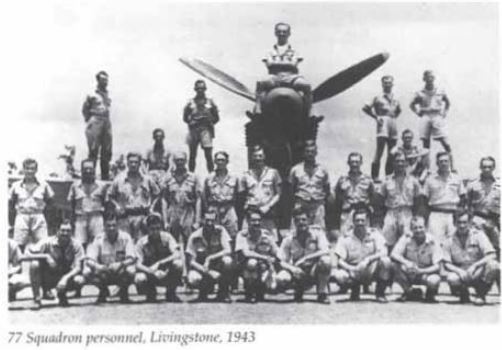No. 77 Squadron RAAF
From Our Contribution
 | |
Brief History
77 Squadron was formed at Pearce, Western Australia on 16 March 1942. Equipped with Curtiss P-40E Kittyhawks, it formed the main air defence for Perth until July when it was sent north and became the first Australian fighter squadron to serve in the Darwin area. For the ground personnel the move to the NW Area was by road to Guildford, then by train to Port Pirie where they changed trains for Alice Springs. From Alice Springs they went by truck to Birdum and then to Batchelor. The trip took 13 days.
The Squadron drew its first blood on 23 November when the Commanding Officer, Squadron Leader R.C. Cresswell, intercepted and shot down a 'Betty' bomber, the first night kill over Australian soil. On 23 November 1943, w1th new P-40K Kittyhawks, the Squadron moved to Milne Bay. The unit's first daylight kill was on 11 Apr 1943, one Zero destroyed and another damaged. The Japanese launched a huge a1r strike on Milne Bay on 14 April. For the loss of one Kittyhawk, four enemy bombers and two fighters were destroyed w1th another five bombers claimed as probables.
The Squadron moved to Goodenough Island on 15 Jun 1943. From 22 July 1944, several major RAAF raids were made using the aircraft as a fighter bomber.The Americans landed on Los Negros on 29 Feb 1944. It was planned to establish air operations on the islands as soon as possible with
76, 77 and 79 Squadrons RAAF providing fighter support. Resistance was heavy and 77 Squadron's ground party arrived by landing craft seven days later, and walked straight into the front lines. The first Kittyhawks to arrive on 7 Mar 1944 were those of 76 Squadron. Threatened by Japanese sniper fire, and working in appalling conditions, the p77 Squadron ground staff maintained these aircraft until 76's own ground crew could fly in six days later, along with the first Kittyhawks, of 77 Squadron. 77 Squadron's main task was to cover supply sh1pping, but strikes were made supporting the Americans on nearby Manus Island. The islands were finally secured on 30 March.
By August 1944, the Americans on Los Negros no longer required fighter cover and 77 Squadron transferred to 81 Wing on Noemfoor, arriving at
Kamiri Airstrip on 14 September. The Squadron bombed enemy positions on the Vogelkop Peninsula throughout October but also suffered losses. 77 Squadron's Kittyhawks arrived on Morotai on 13 Apr 1945 and flew their first sorties on the 21st. While returning, one pilot ran short of fuel and baled out. He was rescued by an American PT boat. 81 Wing took part in the invasion of Labuan Island and Brunei and 77 Squadron's first operation, an attack on Keningau and Sapong (North Borneo) occurred on 3 July. The rest of July was spent attacking Japanese targets in North Borneo. The end of the War in August did not mean 77 Squadron was going home, going instead converting to P51 Mustangs and going to Japan as part of the British Commonwealth Occupation Force, and in time from there to Korea before it returned to Australia.
Ground Crew
- Ernest John Allen 11 Jul - 1 Aug 1942
- Harold Gordon Unwin 31 Jul 1942 - 12 Jan 1943
- Reginald William Jordan 5 Sep 1942 - 26 Apr 1943
Notes
Content has come from Units of the Royal Australian Air Force - A Concise History - Volume 2 Fighter Units pp 54 - 57 - Australian Government Publishing Service - 1995